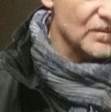Fabrizio Ulivieri's Blog, page 52
May 6, 2023
Octavio Paz: sobre el amor y la mirada

El amor es una palabra llena de significado diversos y contradictorio. Al mismo tiempo es universal. Todos lo hombres la usamos. Y para cada hombre tiene un significado particular, una imagin individual. Y, sin embargo, como la luna que es distinta en todos lados es la misma luna, tambien el amor, en cierto modo, es el mismo en todos lados.
Sus ojos:
el pacto del sol de verano con el sol de otoño.
Nuestros cuerpos
se hablaron, se juntaron y se fueron.
Nosotros nos fuimos con ellos.
Sí, tenían razón los poetas provenzales, los poetas de la edad media y los del renacimiento, y los de la edad barroca, y los modernos cuando dicen que el amor comienza con los ojos y cuando dicen, también, que el amor, que los ojos despiden, arrojan flechas, Se dice todavía, el flechazo. Sí, el amore comienza cuando dos personas se miran una a la otra. Yo no so se el amore sea conocimiento como pensaba Platón, pero sí, creo que el amor es reconocimiento. Reconocemos en la persona que queremos una imagen muy antigua que teníamos grabada en los repliegues de nuestro ser. Y también, y esto lo más importante, quizá, o igualmente importante, nos sentimos reconocidos. Sentimos que alguien nos reconoce, que alguien nos ve de verdad.
Follow me on Substack

May 5, 2023
Se io mi guardo intorno
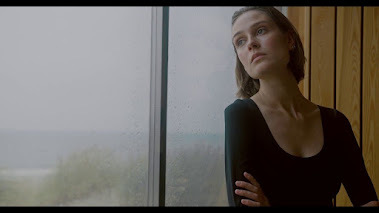
...tenían razón los poetas provenzales , los poetas de la edad media y los del renacimiento, y los de la edad barroca, y los modernos cuando dicen que el amor comienza con los ojos...(Octavio Paz)
Se io mi guardo intorno, non ho dubbiche chi ha creato noi, sia solo amore.
Se guardo i corpi, i volti le mani
i piedi e gambe, le pancie e le occhiaie le mammelle cadenti, e le rughe nei vecchi, quelli che soffrono solie piangono e quelli che feliciridono, e i belli e i brutti, i giovani immortali - non è dubbio che il creatore sia fatto di solo amore - non vi è dubbio il creato inizi dall'amore che è beato.Quanto brutto è l' uomo che cattivo,
il male interiore lo trasforma nelle sue parti, tutto esterioreappare il livore , che deforma l'essere - non ho dubbio e lo penso davvero allora - che chi ha creato noi, sia solo amore - e di silenziodignità di chi sente, vive e vedecapisce questo amore che negli occhi tien i segni la soglia oltre quale stanno certi i sogni.
Follow me on Substack

April 30, 2023
Poetry, Beauty and God's breathing
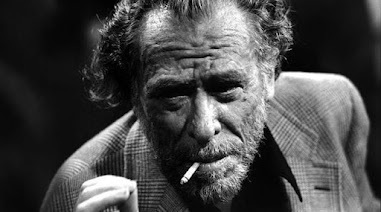
In this poem, Bukowski is an excellent example of what I am saying, that poetry says to the poet by naming things where you have to go and where you have to go is the threshold of Beauty, which is the point where you are transcending this life (saeculum) and you hear the breath of God on you.And poet can be everyone, who is looking for Beauty and lives and experiences Beauty in life, without writing it on paper.
your life is your life
don’t let it be clubbed into dank submission.
be on the watch.
there are ways out.
there is light somewhere.
it may not be much light but
it beats the darkness.
be on the watch.
the gods will offer you chances.
know them.
take them.
you can’t beat death but
you can beat death in life, sometimes.
and the more often you learn to do it,
the more light there will be.
your life is your life.
know it while you have it.
you are marvellous
the gods wait to delight
in you.
(The Laughing Heart by Charles Bukowski)
Follow me on Substack

April 29, 2023
Midday malaise
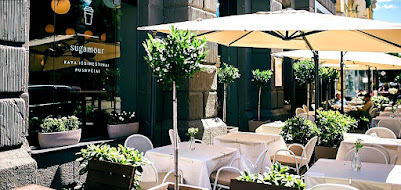
It has been beautiful to sit quietly down at that coffee along Pilies gatvė.
It has always been something he wanted to do.
Many times passing by he had seen people sitting there outside.
One day I will sit there having a coffee me too, like a tourist. He said to himself many times, every time he was passing by.
Why, he wanted that so much?
Well, he couldn't have that picture clear about that "Why".
His condition, he thought, was not far, he thought, far away from being a tourist. A tourist is far from his country and he doesn't belong to the place where he is. So, am I.He thought it, while blissed by the unusual sun was sitting finally at the coffee, outside, like a tourist.Blissed, was the right word. Every moment of those moments he was cherished in that pond of a midday sun was a blessing in which he remained immersed, as if seized by his inward explorations.So, he lived lost to the sun, gripped in that malaise, where he knew he was in a no-where land, being dammed to cross that land where no bound, no ties, no belong-to is alive.
April 25, 2023
Fine di un giorno
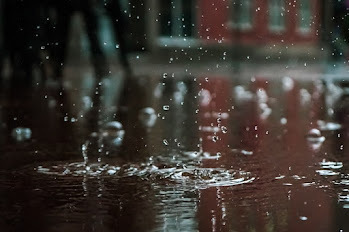
Il giorno sta per finire. Volge al termine.
Ho lavorato tutto il giorno allo spazio Ikea del centro commerciale di Panorama.
C'era il sole. Poi come sempre in Lituania, all'improvviso il tempo cambia e si volge al peggio.
E ora dalle ampie finestre dello spazio Ikea, vedo giù le strade bagnate e l'aria nera e la pioggia che cade a dirotto.
Che giorno è stato? mi chiedo.
E non mi so rispondere. Non so trovare una risposta.
Vita strana la mia vita ultimamente. Non vi è una ragione, più. Un motivo fondante. E' quasi un gioco fra me e...e non lo so. E davvero quel "non lo so" è il mio avversario ormai, di tutti i giorni, con cui lotto e combatto e per ora perdo, perché una risposta non la trovo.
Gli ultimi due anni hanno lasciato il segno, ed è profondo.
Il mondo ha conosciuto l'orrore e ancora non è finito. E potrebbe essere ancora più orrore di quello che abbiamo patito.
Ma il giorno è finito nella pioggia e il buio scende.
E mi ricordo che anni fa quando cadeva la notte divenivo triste. Ma ora la tristezza i due anni di orrore se la sono portata via.
E uscirò fra poco, incontro alla pioggia, alla notte lituana, in camicia nonostante il freddo.
E sorriderò. A me stesso, solo, però.
Piccolo saggio di esistenza quotidiana - la forza del vivere

Ci sono giorni che sono dominati dal nulla. Dall'indecisione. E quei giorni non sono facili da risolvere.
Il senso di pesantezza in tutto quello che fai domina. Non trovi la forza per iniziare. Eppure sai che devi iniziare. Che non puoi lasciarti andare e annegare in quell' inedia.
E in quei giorni allora mi raccolgo in me stesso. E vorrei pregare, ma mi rendo conto che nemmeno quello riesco.
E mentre cerco una via di uscita, arrivo a un punto decisivo: ora che gli anni si sono accumulati e ho perso molte aspettative, tendo a guardare indietro. Ma non al passato. Al presente che vivo, invece. Solo che cerco di guardarlo con i modelli che scoprivo allora quando guardavo al futuro e ignoravo il presente. E riscopro Dante, Leopardi, Foscolo, il Parini... che avevo non dimenticato, ma come dei file, li avevo salvati da qualche parte. E ora riapro quelle cartelle e apro i PDF che vi stavano salvati e di nuovo li trovo interessanti, più di allora, di quando li avevo archiviati e credevo che i contenuti fossero vecchi e inattuali.
E il senso di respirare meglio è forte.
Ritrovo le radici, di una vita che totalmente è cambiata, che quasi stenti a credere sia la realtà quella vera. E sai per certo che non lo è ma la devi vivere e sopportare.
E capisci che il cerchio si chiude. Ma non ti dispiace che si chiuda, perché fuori di quel cerchio, tu non sei più tu. E' un mondo che non ti appartiene.
E così d'improvviso mi alzo e so, da quale punto quel giorno sia meglio iniziare.Se esiste una realtà non è certo quella che vivi ma quella che ti ha ispirato a vivere. A imparare la direzione della tua vita e come muoverti in un mondo che di per sé è indifferente alla tua esistenza e prova sempre e comunque ad annichilirti, a estrometterti, se perdi la voglia e la forza di alzarti la mattina e ripartire, ogni giorno, giorno dopo giorno, fino all'ultimo giorno.
Follow me on Substack

April 23, 2023
Joseph Roth's writing techniques - from what already is into what is coming
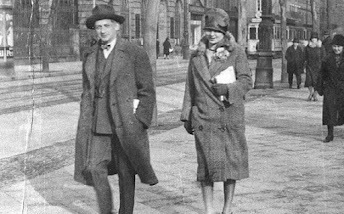
I recently started reading Joseph Roth, his famous novel "Radetzkymarsch".
There is a way of his writing style, a sophisticated technique, that struck me.
We observe a starting point, from a focalized close object, which opens the field where the object is situated, and then enlarges towards more ample horizons where the thought is going to resonate in a fading step by step. When the resonance has almost faded, the descriptive action of the resonating starting point ends in a logical but turning point resolution.
A technique which I would resume in moving from what already is into what is coming
Sump up.
After being wounded in battle, saving the emperor's life, Lieutenant Joseph Trotta was appointed captain and granted the noble title by the emperor himself. After his recovery, the Lieutenant tries to return to everyday life as before. Here starts a long tracking shot backwards, from a close-up of his face reflected in the mirror, the thoughts widen up to a point as to involve his entire life until they end the tracking shot by narrowing down to the relationship with his father on whom the resolution focuses and the entire descriptive procedure ends
Let's check the first example.
"Every night before retiring and every morning upon awakening, as if his own life had been traded for a new and alien life manufactured in a workshop, he would repeat his new rank and his new status to himself and walk up to the mirror to confirm that his face was the same. Despite the awkward heartiness of army brethren trying to bridge the gulf left by a sudden and incomprehensible destiny, and in spite of his own vain efforts to encounter everyone as unabashedly as ever, the ennobled Captain Trotta seemed to be losing his equilibrium; he felt he had been sentenced to wear another man’s boots for life and walk across a slippery ground, pursued by secret talking and awaited by shy glances...
To the son of a noncommissioned officer, the rank of an ordinary infantry lieutenant had seemed natural and suitable. But to the decorated, aristocratic captain, who went about in the alien and almost unearthly radiance of imperial favor as in a golden cloud, his own father had suddenly moved far away, and the measured love that the offspring showed the old man seemed to require an altered conduct and a new way for father and son to deal with each other... [the] letters to his father, on yellowish and pulpy octavo, resembled one another like furlough orders and regulation forms. After the salutation Dear Father at the left, four fingers from the top and two from the side, they began with the terse news of the writer’s good health, continued with his
More evident this technique is in the second example. Movement from nightly shadows to the resolution to visit the father.
" On that silent evening when, for the first time since his recovery, Captain Trotta, in order to perform the correspondence duty, sat down at the table, which was lavishly carved up and notched over by the playful knives of bored men, he realized he would never get beyond the salutation Dear Father. Leaning the barren pen against the inkwell, he twisted off the tip of the wick on the guttering candle as if hoping for a happy inspiration and an appropriate phrase from its soothing light, and he gently rambled off into memories of childhood, village, mother, and military school. He gazed at the gigantic shadows cast by small objects upon the bare blue lime-washed walls, at the slightly curved, shimmering outline of the saber on the hook by the door, and, tucked into the saber guard, at the dark neckband. He listened to the tireless rain outside and its drumming chant on the tin-plated windowsill. And he finally stood up, having resolved to visit his father the week after the prescribed thank-you audience with the Kaiser, for which he would be detailed during the next few days."
------------------------------
The English translations are by JOACHIM NEUGROSCHEL
Follow me on Substack

April 20, 2023
Poetry dwells near the divine light's breath
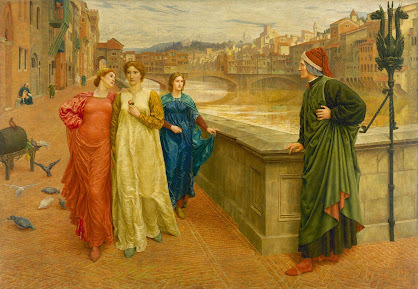
The comparison between poetry and divine light that we proposed HERE finds its perfect exemplification in Saint Paul, Letters to the Romans I,19: τὸ γνωστὸν τοῦ θεοῦ φανερόν ἐστιν ἐν αὐτοῖς, ὁ ⸂θεὸς γὰρ αὐτοῖς ἐφανέρωσεν, what can be known of God was manifested to them (in men), indeed God manifested to them.
Poetry unveils in humanity the need to be human, i.e.the need for beauty, for feeling the beauty in itself and with itself, and this feeling is supported by the divine light. As we are influenced by the idea of Saint Augustine of saeculum, we maintain that poetry belongs to the saeculum and therefore stops on the threshold of the divine light [ I] without crossing that threshold, but it senses the light beyond that threshold.
We are taken to that threshold by the human feeling of beauty within us that leads us up to there: up to that door that it is not possible to cross in our being human, but nevertheless, the very dwelling on that threshold is illuminated by the very naming the names of the things which poetry asks the poet for being nominated [II], and makes that the poet looks for the possible ways and words to express them, to name something that cannot be named yet [III].
Finally, we can end this short but dense note by assuming that poetry is what causes the divine light to breathe in/over the saeculum. It keeps alive the breath through the names and words of the poem. And in this breath, poetry brings us closer to the truth [IV], since no one can lie to the beauty in itself, that every poet receives (through poetry) from its own divine light at the moment the poet feels the divine breath's hovering around when he names things. And in this approaching and naming things we name the truth because at that moment we are naked and we are mirroring ourselves in it, incapable of lying. And while we uncover the truth we are brought closer to eternity, since, as Saint Augustine says: tanto quisque ab aeternitate discedat, quanto a veritate discedit, how much one moves away from the truth, so much one moves away from eternity [V].
Is therefore poetry the voice of eternity in the civitas hominum?
-------------------------
[I] On the theme of the threshold in poetry, see HERE[II] This idea is from of Octavio Paz's poetry vision. HERE.
[III] On this issue, see again HERE
[IV] To understand the metaphor of breathing, think of the tree that by breathing purifies the air and those who live under the trees are purified by getting closer to the status of well-being
[V] De Mendacio Liber Unus 7,10
Follow me on Substack

April 19, 2023
La poesia abita in prossimità della luce divina
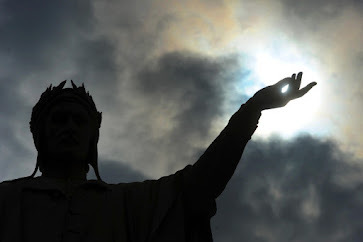
Il paragone fra la poesia e la luce divina che abbiamo QUI inaugurato trova una sua esemplificazione in San Paolo, lettere ai Romani I,19: τὸ γνωστὸν τοῦ θεοῦ φανερόν ἐστιν ἐν αὐτοῖς, ὁ ⸂θεὸς γὰρ αὐτοῖς ἐφανέρωσεν, ciò che si può conoscere di Dio è stato manifestato a loro (negli uomini), Dio infatti ha manifestato a loro.La poesia manifesta negli uomini il bisogno di essere umano, il bisogno cioè della bellezza, del sentimento del bello in sé e con sé, ed è supportata dalla luce divina, ma la poesia appartiene al saeculum e dunque si arresta sulla soglia di quella luce [I] senza oltrepassarla, ma presentisce la luce oltre la soglia.Fino a quella soglia ci conduce l'umano in noi: fino a quella porta che non è possibile varcare nel nostro essere umani ma che tuttavia il dimorare in quella soglia illumina nominando i nomi delle cose che la poesia chiede al poeta di manifestare [II] , e il poeta cerca il modo e le parole per manifestarle, per nominare qualcosa che non si può nominare tuttavia [III].La poesia, infine, è ciò che fa che la luce divina respiri nel saeculum. Che respira attraverso i nomi e le parole della poesia. E in questo respiro la poesia ci avvicina alla verità [IV], poiché nessuno può mentire al bello in sé se stesso, ovvero al bello che si riceve, tramite la poesia, dalla propria luce divina nel momento che la si scopre nel suo respiro nominando le cose. E in questo avvicinarci e nominare le cose nominiamo la verità perché in quel momento siamo nudi con noi stessi e incapaci di mentire e il discoprimento della verità ci avvicina dunque all'eternità, poiché come dice Sant'Agostino: Sed cum tanto quisque ab aeternitate discedat, quanto a veritate discedit. quanto ci si allontani dalla verità, tanto ci si allontana dalla eternità [V].
[I] Sul tema della soglia nella poesia si veda QUI[II] Questa idea sta alla base della poesia di Octavio Paz. QUI.[III] Su questo tema si veda QUI[IV] Per capire la metafora del respiro, si pensi all' albero che respirando purifica l'aria e chi vive sotto gli alberi purifica se stesso avvicinandosi al benessere[V] De Mendacio Liber Unus 7,10
Follow me on Substack

April 18, 2023
La mediocrità nel cinema italiano e della società italiana. Un'affermazione di Cesare Sacchetti
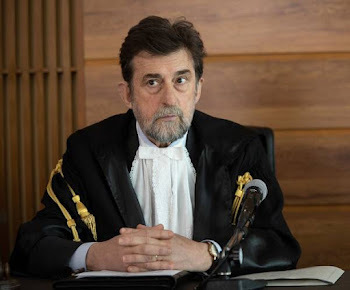
Riposto e faccio mio quanto afferma Cesare Sacchetti nel suo canale Telegram. Opinione che condivido al 100%.
Cesare Sacchetti è un analista politico incredibile. Ha una capacità di visione globale che pochi hanno.
Ha un solo difetto: crede molto in questa massa indistinta e amorfa chiamata "popolo italiano", non ha ancora ben capito con che materiale ha a che fare. Con il Nulla, praticamente.
"A quanto pare, Nanni Moretti ha fatto l'ennesimo film con Silvio Orlando e l'ennesimo film dove al posto della vespa stavolta c'è il monopattino. Il mondo dello spettacolo è lo specchio del mondo della politica. Pieno di mediocri che si trovano lì solo per la loro fedeltà all'establishment."
Aggiungo che Nanni Moretti se poteva avere un senso all'inizio (Bianca, La messa è finita) da allora fa sempre lo stesso film con più o meno gli stessi tempi, battute, attori e gli stessi temi.
Follow me on Substack


